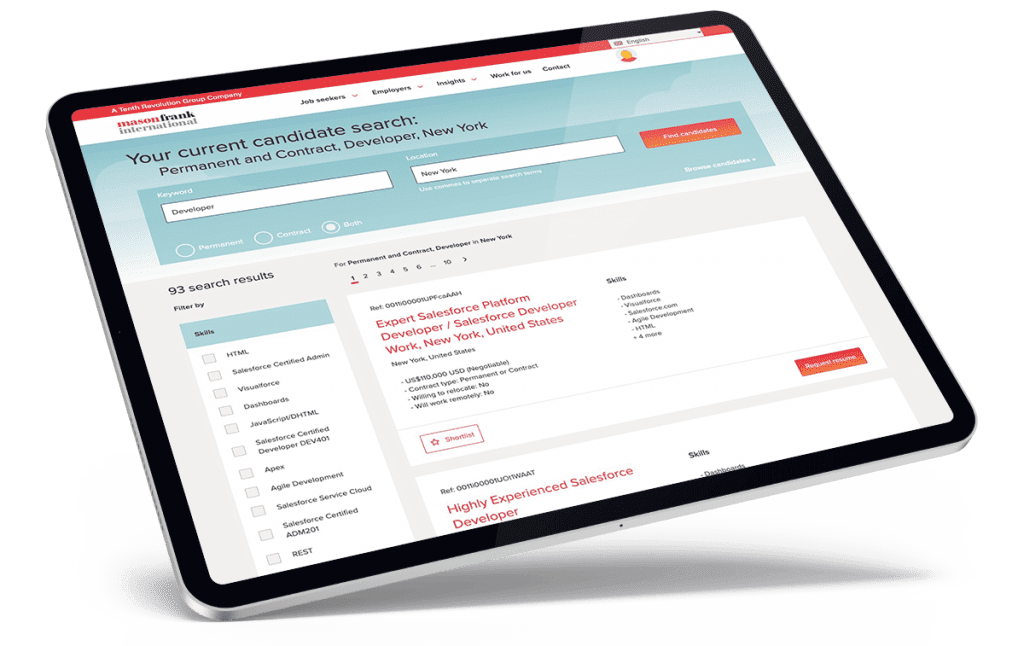The digital skills gap

As the platform continues to grow in terms of scope and capability, the skills required to deliver an exceptional Salesforce implementation continue to increase. Great news for businesses with digital transformation driving their growth, but not so good for an ecosystem that was already facing a major skills shortage.
In fact, 53% of hiring managers (a small decrease from 56% in our last survey) acknowledge the existence of an IT skills gap within the Salesforce community. Of those respondents, 48% indicate that the skills gap has widened over the past 12 months, a slight increase from 46% in our previous study.
Despite the challenges of the last 12 months, the Salesforce job market is trending upward. The platform’s increasing capabilities continue to create opportunities for skilled professionals, meaning the outlook within the ecosystem remains positive—companies remain keen to maximize their investment in Salesforce.
For professionals with an aptitude for continuous learning and expanding their skill sets there’s much to look forward to, although it goes without saying that won’t come as much consolation to employers. Indeed, nearly a third (31%) of organizations we spoke with have been understaffed for more than three months due to unfilled job vacancies.
What is your organization’s biggest challenge in closing the digital skills gap?
Among those who believe there is an IT skills gap, 48% highlight the time taken to find the right talent as the main challenge in bridging the skills gap in their organization. This is a shift from our last survey, where the scarcity of qualified talent ranked as the top concern—this now ranks second.
To what extent is the skills gap affecting organizations’ strategic objectives?
-
 Minimally 17%
Minimally 17% -
 Slightly 25%
Slightly 25% -
 Moderately 42%
Moderately 42% -
 Considerably 16%
Considerably 16% -
 Extremely 0%
Extremely 0%
The proportion of organizations that believe they have been significantly impacted by the skills gap has decreased from 42% to 16%. This change might be due to organizations investing more in internal training and development to upskill their staff or refining their recruitment processes to better identify the best candidates for the roles.
How is the skills gap impacting businesses’ strategic objectives?

Increased turnover (e.g., as a result of employee burnout or losing staff to competitors)

Difficulty keeping up with demand for services
Increased costs due to hiring contractors
| Increased workload on current staff | |
| Missing project deadlines | |
| Less growth than expected | |
| Decreased profitability |
Over a quarter 27% (down from 57% in our last study) of hiring managers express concern about the impact of the skills gap on their organization's performance.
How are organizations looking to address the skills gap?
-
 Building skills in-house 55%
Building skills in-house 55% -
 Hiring new permanent staff 49%
Hiring new permanent staff 49% -
 Hiring contractors 33%
Hiring contractors 33% -
 Not sure 13%
Not sure 13%
Struggling to find top Salesforce talent?
Start your search in just a few clicks:

Conclusion
Salesforce talent remains tough to get hold of, with almost a third of organizations saying they’ve been understaffed for more than three months because of unfilled job vacancies. Our data indicates that Salesforce candidates are out there, but they’re often time-consuming and costly to acquire, with 48% of hiring managers citing the time it takes to source the right talent as their primary concern.
The good news is that the Salesforce skills gap does not appear to be causing as substantial an impact as it has in previous years, with organizations stating that they’ve been significantly impacted by the skills gap decreasing from 42% to 16%.
This could be because organizations are investing more in internal upskilling due to the grueling and competitive talent market they’ve been faced with over the past few years. Over half (55%) of respondents say they’re addressing skills gaps by building skills in-house, indicating that more businesses are turning to reskilling and career changing initiatives to create the talent they need, rather than trying to source it externally.
It could also be that, due to challenging economic circumstances, fewer businesses are trying to recruit Salesforce professionals or are scaling back their digital transformation goals.
MASON FRANK’S
CAREERS AND HIRING GUIDE
KEY FINDINGS 2025



